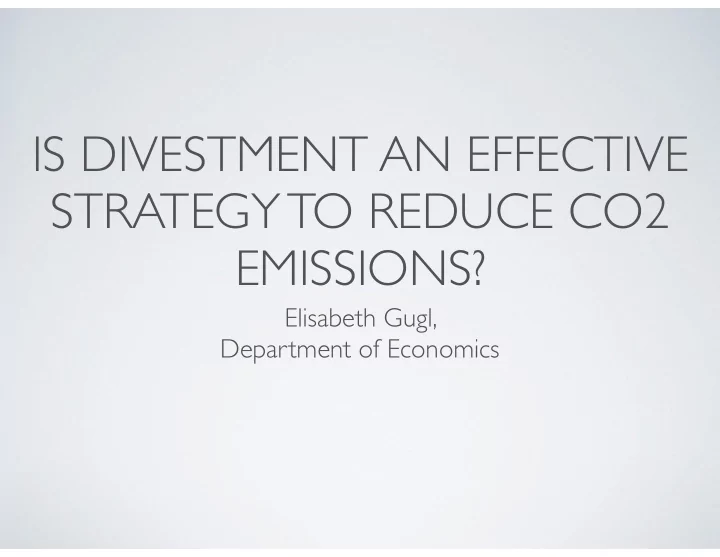

IS DIVESTMENT AN EFFECTIVE STRATEGY TO REDUCE CO2 EMISSIONS? Elisabeth Gugl, Department of Economics
WHAT ARE THE EXPECTED EFFECTS? • Student leaders of the Harvard fossil fuel divestiture campaign state “We do not expect divestment to have a financial impact on fossil fuel companies, as President Faust implied. […]Divestment calls on citizens to build a powerful climate movement and pressure elected representatives to enact meaningful legislation.” • Divestment has “reduced about zero tonnes of emissions. It’s not like you’ve capital-starved people making steel and gasoline,” Microsoft founder Bill Gates told the Financial Times in September. • Others argue that even if divestment outflows are small or short term and do not directly effect future cash flows, they may trigger a different expectation in investors unconcerned about climate change and may lead to downward pressure on the stock price of a targeted firm.
INDIRECT EFFECTS • According to the Stranded Assets Programme, the outcome of a stigmatization process poses the most far-reaching threat to fossil fuel companies and the vast energy value chain. • If during the stigmatization process, campaigners are able to create the expectation that the government might legislate to levy a carbon tax , which would have the effect of depressing demand , then they will materially increase the uncertainty surrounding the future cash flows of fossil fuel companies. • This will indirectly influence all investors—those considering divestment due to moral outrage and those who are neutral—to go underweight on fossil fuel stocks and debt in their portfolios. • While stigmatization will slow fossil fuel companies down, its outcomes are unlikely to threaten their survival.
NORWAY’S WEALTH FUND • Norway is both an early adopter of green technologies and a country whose wealth is built on offshore oil drilling. • The new Johan Sverdrup field is expected to reverse Norway's declining oil output, extending the country's oil industry by decades. • Norway began drilling for oil off its coast in 1969. It also funded the Norwegian Sovereign Wealth Fund, the largest such fund in the world—which has recently divested from many oil and gas stocks, although not integrated oil and gas companies (e.g. EXXON, BP , Shell etc) • The head of the fund said it was not for climate reasons, but because the fund was overexposed to oil prices because their income is almost entirely coming from oil. • Four Canadian oil sands producers have been targeted for divestment: Suncor Energy, Cenovus Energy, Imperial Oil Ltd. and Husky Energy Inc.
INTEGRATED OIL AND GAS COMPANIES • An integrated oil and gas company is a business entity that engages in the exploration, production, refinement, and distribution of oil and gas. Given the high entry costs relating to many oil and gas industry operations, many of the world's largest oil and gas companies, like Chevron Corporation and Exxon Mobile, are integrated. Typically, integrated companies divide their various operations into categories: upstream, which includes all exploration and production endeavours, and downstream, which is confined to refinement and marketing activities.
WHAT’S THE DIRECT MECHANISM BY WHICH DIVESTMENT MIGHT REDUCE FOSSIL FUEL PRODUCTION? • a company financing its resource extraction might either take out a debt or sell equity • investors invest in fossil fuel companies in two ways: buying shares or buying bonds • divestment is thought to have more impact on increasing the cost of borrowing for firms • divestment may have more impact on increasing financing costs of coal explorations than gas and oil
THINGS THAT UNDO DIVESTMENT • According to the Delhi-based Centre for Financial Accountability, primary finance for coal-fired power plants dropped by 93% between 2017 and 2018, while finance for renewables rose by 10%. The problem is that governments step up to finance to fill the financing gap. Among the loans for coal projects in 2018, most came from government-controlled financial institutions, whereas three- quarters of renewables financing came from private commercial banks. • What Bill Gates “gets wrong” in terms of the effects of divestment is that naturals resource extraction requires a lot of capital up front and so financing is a bigger issue than in the software industry. However, integrated firms can self-finance. • Some big fossil fuel producers are not traded on the stock market. • Many fossil fuel companies are state-owned. • Divestment has likely the biggest financial impact on small extraction operations. That’s also the kind of companies the Norwegian Wealth Fund divested from.
REFERENCES • https://www.thenation.com/article/time-divest-response-harvard-president-drew-faust/ • https://fortune.com/2019/10/18/norway-drilling-climate-oil-and-gas/ • https://www.aeaweb.org/articles?id=10.1257/aeri.20180347 • https://www.investopedia.com/terms/i/integrated-oil-gas-company.asp • https://www.smithschool.ox.ac.uk/publications/reports/SAP-divestment-report-final.pdf • https://www.washingtonpost.com/business/energy/how-climate-divestment-won-converts-with-deep-pockets/ 2019/10/23/747e779c-f54f-11e9-b2d2-1f37c9d82dbb_story.html • https://www.washingtonpost.com/business/energy/what-bill-gates-getswrong-about-fossil-fuels/2019/11/19/ bf1d0046-0b18-11ea-8054-289aef6e38a3_story.html • https://www.cnbc.com/2019/09/26/exxon-mobil-to-sell-its-norway-exploration-assets-for-4point5-billion.html • https://www.marketwatch.com/story/finance-is-slowly-turning-green-but-fossil-fuels-still-receive-too-much- support-2019-08-29
Recommend
More recommend